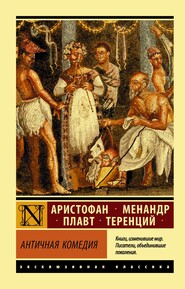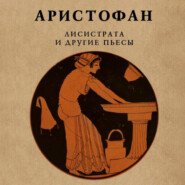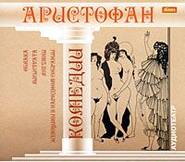По всем вопросам обращайтесь на: info@litportal.ru
(©) 2003-2024.
✖
The Eleven Comedies, Volume 1
Автор
Год написания книги
2018
Настройки чтения
Размер шрифта
Высота строк
Поля
HERMES. She wants to have news of a whole heap of old-fashioned things she left here. First of all, how is Sophocles?
TRYGAEUS. Very well; but something very strange has happened to him.
HERMES. What then?
TRYGAEUS. He has turned from Sophocles into Simonides.[323 - Simonides was very avaricious, and sold his pen to the highest bidder. It seems that Sophocles had also started writing for gain.]
HERMES. Into Simonides? How so?
TRYGAEUS. Because, though old and broken-down as he is, he would put to sea on a hurdle to gain an obolus.[324 - i.e. he would recoil from no risk to turn an honest penny.]
HERMES. And wise Cratinus, is he still alive?[325 - A comic poet as well known for his love of wine as for his writings; he died in 431 B.C., the first year of the war, at the age of ninety-seven.]
TRYGAEUS. He died about the time of the Laconian invasion.
HERMES. How?
TRYGAEUS. Of a swoon. He could not bear the shock of seeing one of his casks full of wine broken. Ah! what a number of other misfortunes our city has suffered! So, dearest mistress, nothing can now separate us from thee.
HERMES. If that be so, receive Opora here for a wife; take her to the country, live with her, and grow fine grapes together.[326 - Opora was the goddess of fruits.]
TRYGAEUS. Come, my dear friend, come and accept my kisses. Tell me, Hermes, my master, do you think it would hurt me to fuck her a little, after so long an abstinence?
HERMES. No, not if you swallow a potion of penny-royal afterwards.[327 - The Scholiast says fruit may be eaten with impunity in great quantities if care is taken to drink a decoction of this herb afterwards.] But hasten to lead Theoria[328 - Theoria is confided to the care of the Senate, because it was this body who named the [Greek: The_orhoi], deputies appointed to go and consult the oracles beyond the Attic borders or to be present at feasts and games.] to the Senate; 'twas there she lodged before.
TRYGAEUS. Oh! fortunate Senate! Thanks to Theoria, what soups you will swallow for the space of three days![329 - The great festivals, e.g. the Dionysia, lasted three days. Those in honour of the return of Peace, which was so much desired, could not last a shorter time.] how you will devour meats and cooked tripe! Come, farewell, friend Hermes!
HERMES. And to you also, my dear sir, may you have much happiness, and don't forget me.
TRYGAEUS. Come, beetle, home, home, and let us fly on a swift wing.
HERMES. Oh! he is no longer here.
TRYGAEUS. Where has he gone to then?
HERMES. He is harnessed to the chariot of Zeus and bears the thunderbolts.
TRYGAEUS. But where will the poor wretch get his food?
HERMES. He will eat Ganymede's ambrosia.
TRYGAEUS. Very well then, but how am I going to descend?
HERMES. Oh! never fear, there is nothing simpler; place yourself beside the goddess.
TRYGAEUS. Come, my pretty maidens, follow me quickly; there are plenty of folk awaiting you with standing tools.
CHORUS. Farewell and good luck be yours! Let us begin by handing over all this gear to the care of our servants, for no place is less safe than a theatre; there is always a crowd of thieves prowling around it, seeking to find some mischief to do. Come, keep a good watch over all this. As for ourselves, let us explain to the spectators what we have in our minds, the purpose of our play.
Undoubtedly the comic poet who mounted the stage to praise himself in the parabasis would deserve to be handed over to the sticks of the beadles. Nevertheless, oh Muse, if it be right to esteem the most honest and illustrious of our comic writers at his proper value, permit our poet to say that he thinks he has deserved a glorious renown. First of all, 'tis he who has compelled his rivals no longer to scoff at rags or to war with lice; and as for those Heracles, always chewing and ever hungry, those poltroons and cheats who allow themselves to be beaten at will, he was the first to cover them with ridicule and to chase them from the stage;[330 - In spite of what he says, Aristophanes has not always disdained this sort of low comedy—for instance, his Heracles in 'The Birds.'] he has also dismissed that slave, whom one never failed to set a-weeping before you, so that his comrade might have the chance of jeering at his stripes and might ask, "Wretch, what has happened to your hide? Has the lash rained an army of its thongs on you and laid your back waste?" After having delivered us from all these wearisome ineptitudes and these low buffooneries, he has built up for us a great art, like a palace with high towers, constructed of fine phrases, great thoughts and of jokes not common on the streets. Moreover 'tis not obscure private persons or women that he stages in his comedies; but, bold as Heracles, 'tis the very greatest whom he attacks, undeterred by the fetid stink of leather or the threats of hearts of mud. He has the right to say, "I am the first ever dared to go straight for that beast with the sharp teeth and the terrible eyes that flashed lambent fire like those of Cynna,[331 - A celebrated Athenian courtesan of Aristophanes' day.] surrounded by a hundred lewd flatterers, who spittle-licked him to his heart's content; it had a voice like a roaring torrent, the stench of a seal, a foul Lamia's testicles and the rump of a camel."[332 - Cleon. These four verses are here repeated from the parabasis of 'The Wasps,' produced 423 B.C., the year before this play.]
I did not recoil in horror at the sight of such a monster, but fought him relentlessly to win your deliverance and that of the Islanders. Such are the services which should be graven in your recollection and entitle me to your thanks. Yet I have not been seen frequenting the wrestling school intoxicated with success and trying to tamper with young boys;[333 - Shafts aimed at certain poets, who used their renown as a means of seducing young men to grant them pederastic favours.] but I took all my theatrical gear[334 - The poet supplied everything needful for the production of his piece—vases, dresses, masks, etc.] and returned straight home. I pained folk but little and caused them much amusement; my conscience rebuked me for nothing. Hence both grown men and youths should be on my side and I likewise invite the bald[335 - Aristophanes was bald himself, it would seem.] to give me their votes; for, if I triumph, everyone will say, both at table and at festivals, "Carry this to the bald man, give these cakes to the bald one, do not grudge the poet whose talent shines as bright as his own bare skull the share he deserves."
Oh, Muse! drive the War far from our city and come to preside over our dances, if you love me; come and celebrate the nuptials of the gods, the banquets of us mortals and the festivals of the fortunate; these are the themes that inspire thy most poetic songs. And should Carcinus come to beg thee for admission with his sons to thy chorus, refuse all traffic with them; remember they are but gelded birds, stork-necked dancers, mannikins about as tall as a pat of goat's dung, in fact machine-made poets.[336 - Carcinus and his three sons were both poets and dancers. (See the closing scene of 'The Wasps.') Perhaps relying little on the literary value of their work, it seems that they sought to please the people by the magnificence of its staging.] Contrary to all expectation, the father has at last managed to finish a piece, but he owns himself a cat strangled it one fine evening.[337 - He had written a piece called 'The Mice,' which he succeeded with great difficulty in getting played, but it met with no success.]
Such are the songs[338 - This passage really follows on the invocation, "Oh, Muse! drive the War," etc., from which indeed it is only divided by the interpolated criticism aimed at Carcinus.] with which the Muse with the glorious hair inspires the able poet and which enchant the assembled populace, when the spring swallow twitters beneath the foliage;[339 - The Scholiast informs us that these verses are borrowed from a poet of the sixth century B.C.] but the god spare us from the chorus of Morsimus and that of Melanthius![340 - Sons of Philocles, of the family of Aeschylus, tragic writers, derided by Aristophanes as bad poets and notorious gluttons.] Oh! what a bitter discordancy grated upon my ears that day when the tragic chorus was directed by this same Melanthius and his brother, these two Gorgons,[341 - The Gorgons were represented with great teeth, and therefore the same name was given to gluttons. The Harpies, to whom the two voracious poets are also compared, were monsters with the face of a woman, the body of a vulture and hooked beak and claws.] these two harpies, the plague of the seas, whose gluttonous bellies devour the entire race of fishes, these followers of old women, these goats with their stinking arm-pits. Oh! Muse, spit upon them abundantly and keep the feast gaily with me.
TRYGAEUS. Ah! 'tis a rough job getting to the gods! my legs are as good as broken through it. How small you were, to be sure, when seen from heaven! you had all the appearance too of being great rascals; but seen close, you look even worse.
SERVANT. Is that you, master?
TRYGAEUS. So I have been told.
SERVANT. What has happened to you?
TRYGAEUS. My legs pain me; it is such a plaguey long journey.
SERVANT. Oh! do tell me….
TRYGAEUS. What?
SERVANT. Did you see any other man besides yourself strolling about in heaven?
TRYGAEUS. No, only the souls of two or three dithyrambic poets.
SERVANT. What were they doing up there?
TRYGAEUS. They were seeking to catch some lyric exordia as they flew by immersed in the billows of the air.
SERVANT. Is it true, what they tell us, that men are turned into stars after death?
TRYGAEUS. Quite true.
SERVANT. Then who is that star I see over yonder?
TRYGAEUS. That is Ion of Chios,[342 - A tragic and dithyrambic poet, who had written many pieces, which had met with great success at Athens.] the author of an ode beginning "Morning"; as soon as ever he got to heaven, they called him "the Morning Star."
SERVANT. And those stars like sparks, that plough up the air as they dart across the sky?[343 - The shooting stars.]
TRYGAEUS. They are the rich leaving the feast with a lantern and a light inside it. But hurry up, show this young girl into my house, clean out the bath, heat some water and prepare the nuptial couch for herself and me. When 'tis done, come back here; meanwhile I am off to present this one to the Senate.
SERVANT. But where then did you get these pretty chattels?
TRYGAEUS. Where? why in heaven.
SERVANT. I would not give more than an obolus for gods who have got to keeping brothels like us mere mortals.
TRYGAEUS. They are not all so, but there are some up there too who live by this trade.











